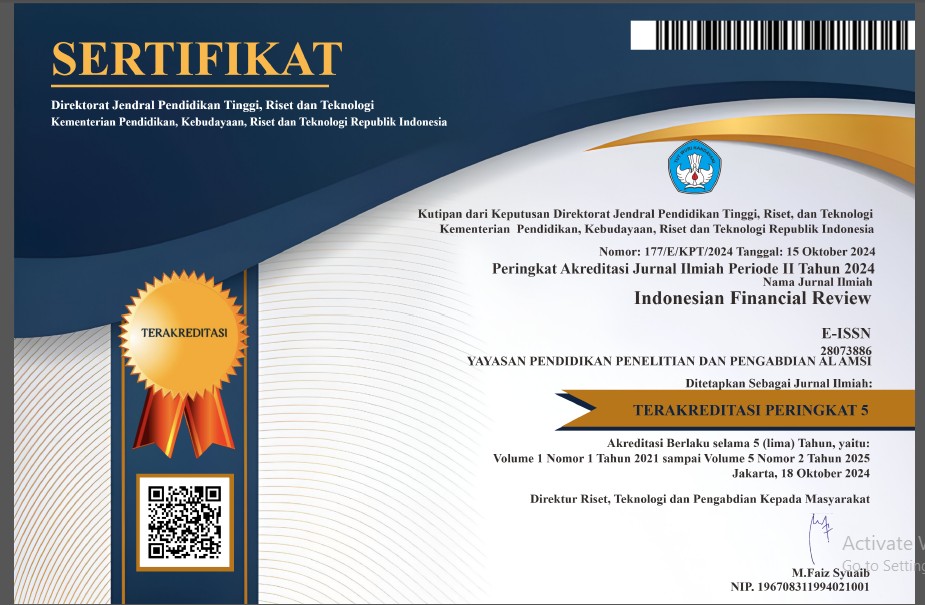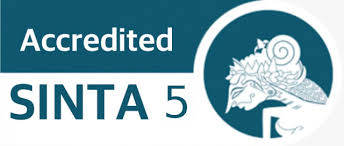Modeling Entrepreneurial Intentions among University Students: A Behavioral Finance Perspective Using PLS-SEM
DOI:
https://doi.org/10.55538/ifr.v5i1.56Keywords:
Entrepreneurial Interest, Self-Esteem, Entrepreneurial Knowledge, Self-Efficacy, Entrepreneurship EducationAbstract
This study investigates the factors influencing entrepreneurial interest among university students, focusing on the roles of self-esteem, entrepreneurial knowledge, and self-efficacy. Using a structural modeling approach, entrepreneurial interest is analyzed as the dependent variable influenced by these psychological and cognitive constructs. A key aim of the study is to examine the mediating role of entrepreneurial knowledge between self-efficacy and entrepreneurial interest. The results reveal that both self-esteem and entrepreneurial knowledge have direct and significant effects on entrepreneurial interest. Notably, self-efficacy does not influence entrepreneurial interest directly but exerts its effect indirectly through entrepreneurial knowledge, indicating a full mediation. This finding challenges the assumption that self-belief alone is sufficient to foster entrepreneurial motivation and highlights the importance of knowledge acquisition as a cognitive pathway toward entrepreneurial engagement. The study offers practical implications for improving entrepreneurship education—particularly in developing strategies that integrate confidence-building with knowledge-focused learning.
References
Ahmad, M. A., Hashmi, A., Arshad, I., & Loh, C. (2021). Role of entrepreneurial passion and entrepreneurial self- efficacy in developing students’ intention to become an entrepreneur: An evidence from Malaysia.
Andriani, R., Hamdani, N. A., & Setiawan, R. (2020). THE EFFECT OF ENTREPRENEURSHIP KNOWLEDGE ON SELF EFFICACY AND ITS IMPACT ON STUDENTS INTERESTS.
Bandura, A. (1997). Self-efficacy: The exercise of control. New York, NY: W.H. Freeman
Boubker, O., Naoui, K., Ouajdouni, A., & Arroud, M. (2022). The effect of action-based entrepreneurship education on intention to become an entrepreneur. MethodsX, 9, 101657. https://doi.org/10.1016/j.mex.2022.101657
Chairunnisa, Purwana, D., & Munawaroh. (n.d.). THE EFFECT OF ENTREPRENEURSHIP EDUCATION, INNOVATION, AND ENTREPRENEURIAL MOTIVATION ON ENTREPRENEURIAL INTEREST IN STUDENTS OF THE FACULTY OF ECONOMICS, STATE UNIVERSITY.
Chen, C. C., Greene, P. G., & Crick, A. (1998). Does entrepreneurial self-efficacy distinguish entrepreneurs from managers? Journal of Business Venturing, 13(4), 295–316. https://doi.org/10.1016/S0883-9026(97)00029-3
Deliana, M. (2023). Self-Efficacy as A Factor of Entrepreneurial Intention. Journal of Education Humaniora and Social Sciences (JEHSS), 5(4), 2573. https://doi.org/10.34007/jehss.v5i4.1758
Eliyana, A., Mustain, Sridadi, A. R., & Widiyana, E. U. (2020). The Role of Self-Efficacy On Self-Esteem and Entrepreneurs Achievement. Systematic Reviews in Pharmacy, 11(8), 314. https://doi.org/10.31838/srp.2020.8.48
Fabeil, N. F. (2019). Entrepreneurship Education and Entrepreneurial Behaviour among Undergraduate Students in Sabah, Malaysia. Journal of Economics and Business, 2(4). https://doi.org/10.31014/aior.1992.02.04.151
Fan, J., Hu, J., & Jia, W. (2024). How entrepreneurship education affects college students’ entrepreneurial intention: Samples from China. Heliyon, 10(10). https://doi.org/10.1016/j.heliyon.2024.e30776
Ferreira, J. J., Raposo, M., Rodrigues, R. G., Dinis, A., & Paço, A. (2012). A model of entrepreneurial intention. Journal of Small Business and Enterprise Development, 19(3), 424. https://doi.org/10.1108/14626001211250144
Ghina, A., Simatupang, T. M., & Gustomo, A. (2017). Entrepreneurship Education within Higher Education Institutions (HEIs). In InTech eBooks. https://doi.org/10.5772/intechopen.69043
Gutiérrez, P. I. R., Pérez, M. del P. P., & Alonso-Galicia, P. E. (2018). University entrepreneurship: how to trigger entrepreneurial intent of undergraduate students. Journal of Science and Technology Policy Management, 10(4), 927. https://doi.org/10.1108/jstpm-04-2018-0037
Harudin, K., Fattah, N., & Ahman, E. (n.d.). The Effectiveness of Enterpreneurship Learning in Developing Students’ Entrepreneurial Intentions.
Heniwaty, Y., Budiarta, K., Misgiya, M., & Barus, M. (2019). Entrepreneurship Program for Unimed Students. Proceedings of the 2nd International Conference on Arts and Culture (ICONARC 2018). https://doi.org/10.2991/iconarc-18.2019.97
Hair, J. F., Hult, G. T. M., Ringle, C. M., & Sarstedt, M. (2019). A primer on partial least squares structural equation modeling (PLS-SEM) (2nd ed.). Thousand Oaks, CA: Sage Publications.
Huang, Y., Zhang, J., Xu, Y., Sun, S., Bu, Y., Li, S., & Chen, Y. (2024). College students’ entrepreneurship policy, regional entrepreneurship spirit, and entrepreneurial decision-making. Humanities and Social Sciences Communications, 11(1). https://doi.org/10.1057/s41599-024-03242-8
Karmoker, M., Mia, Md. U., Biswas, R., Hossain, Md. J., Ara, Mst. A., & Alim, Md. A. (2020). Entrepreneurial Intention of University Graduates of Bangladesh: Looking for New Economic Opportunities. Advances in Economics and Business, 8(6), 311. https://doi.org/10.13189/aeb.2020.080601
Kujala, I., Nyström, A.-G., Wendelin, C., & Brännback, M. (2021). Action-Based Learning Platform for Entrepreneurship Education—Case NÅA Business Center. Entrepreneurship Education and Pedagogy, 5(4), 576. https://doi.org/10.1177/25151274211045913
Li, Y., Cao, K., & Jenatabadi, H. S. (2023). Effect of entrepreneurial education and creativity on entrepreneurial intention in college students: mediating entrepreneurial inspiration, mindset, and self-efficiency. Frontiers in Psychology, 14. https://doi.org/10.3389/fpsyg.2023.1240910
Liu, X., Lin, C., Zhao, G., & Zhao, D. (2019). Research on the Effects of Entrepreneurial Education and Entrepreneurial Self-Efficacy on College Students’ Entrepreneurial Intention. Frontiers in Psychology, 10. https://doi.org/10.3389/fpsyg.2019.00869
Lubada, F., Kusumojanto, D. D., & Indrawati, A. (2021). The Mediating Entrepreneurial Self-efficacy Between Entrepreneurship Education, Need For Achievement, and Creativity on Entrepreneurial Intention. Journal of Business Management Review, 2(12), 832. https://doi.org/10.47153/jbmr212.2602021
Martyajuarlinda, P., & Kusumajanto, D. D. (2018). EFFECT OF ENTREPRENEURSHIP EDUCATION AND SELF EFFICACY TOWARDS THE INTENTION OF ENTREPRENEURSHIP. JPBM (Jurnal Pendidikan Bisnis Dan Manajemen), 4(3), 142. https://doi.org/10.17977/um003v4i32018p142
Mauludiana, M. S., Supriatna, N., & Sojanah, J. (2020). THE INFLUENCE OF ENTREPRENEURSHIP KNOWLEDGE AND SELFnEFFICACY TOWARDS ENTREPRENEURIAL INTENTION STUDENTS OFnCLASS XI IPS SENIOR HIGH SCHOOL.
Memon, M., Soomro, B. A., & Shah, N. (2019). Enablers of entrepreneurial self-efficacy in a developing country. Education + Training, 61(6), 684. https://doi.org/10.1108/et-10-2018-0226
Mukhtar, S., Wardana, L. W., Wibowo, A., & Narmaditya, B. S. (2021). Does entrepreneurship education and culture promote students’ entrepreneurial intention? The mediating role of entrepreneurial mindset. Cogent Education, 8(1). https://doi.org/10.1080/2331186x.2021.1918849
Neto, R. do C. A., Rodrigues, V. P., Stewart, D., Xiao, A. Q., & Snyder, J. (2018). The influence of self-efficacy on entrepreneurial behavior among K-12 teachers. Teaching and Teacher Education, 72, 44. https://doi.org/10.1016/j.tate.2018.02.012
Nopriadi, S., Khairinal, & Rosmiati. (2022). EFFECT SELF EFFICACY, ENTREPRENEURSHIP EDUCATION AND SUBJECTIVE NORMS ON STUDENT ENTREPRENEURSHIP BEHAVIOR.
Pramesti, F., & Sukirno, S. (2025). Students’ Entrepreneurial Interest As A Mediation Of The Influence Of Entrepreneurship Education, Digital Literacy And Social Media On Student Entrepreneur Success At Feb State University Of Yogyakarta. International Journal of Education Language Literature Arts Culture and Social Humanities, 3(1), 113. https://doi.org/10.59024/ijellacush.v3i1.1272
Saoula, O., Shamim, A., Ahmad, M. J., & Abid, M. F. (2023). Do entrepreneurial self-efficacy, entrepreneurial motivation, and family support enhance entrepreneurial intention? The mediating role of entrepreneurial education. Asia Pacific Journal of Innovation and Entrepreneurship, 17(1), 20. https://doi.org/10.1108/apjie-06-2022-0055
Shuming, X., Luo, J., Zheng, Y., & Ma, C. (2022). Entrepreneurship education of college students and entrepreneurial psychology of new entrepreneurs under causal attribution theory. Frontiers in Psychology, 13. https://doi.org/10.3389/fpsyg.2022.943779
Sudjarwo, R., Wahyudin, A., & Sudarma, K. (2019). The Role of Self-Efficacy in Mediating the Effect of Entrepreneurial’s Knowledge, Personality and Family Circles Against the Enterprise’s Interest.
Suryani, N. K., Dewi, L. K. C., & FoEh, J. Ehj. (2021). Business Creation through Creativity and Innovation among Students. JURNAL MINDS Manajemen Ide Dan Inspirasi, 8(2), 225. https://doi.org/10.24252/minds.v8i2.20981
Tewal, E. H. P., & Sholihah, Z. (2020). Self-Regulation Toward Entrepreneurship Intention: Mediated by Self-Efficacy in the Digital Age. Proceedings of the 4th ASEAN Conference on Psychology, Counselling, and Humanities (ACPCH 2018). https://doi.org/10.2991/assehr.k.200120.020
Tirtayasa, S., Khair, H., & Yusri, M. (2021). Influence of Education of Entrepreneurship, Self Efficacy, Locus of Control and Entrepreneurs Characters of Enterprises.
Utomo, S. H., Narmaditya, B. S., Wibowo, A., Ali, A., & Sahid, S. (2022). Social capital and entrepreneurial intention among Indonesia rural community. Journal of Eastern European and Central Asian Research (JEECAR), 9(4), 665. https://doi.org/10.15549/jeecar.v9i4.927
Wijangga, J., & Sanjaya, E. L. (2019). The Relationship between Entrepreneurial Self-Efficacy and Entrepreneurial Intention among University Students. Jurnal Entrepreneur Dan Entrepreneurship, 8(1), 19. https://doi.org/10.37715/jee.v8i1.1113
Wu, L., Jiang, S., Wang, X., Yu, L., Wang, Y., & Pan, H. (2022). Entrepreneurship Education and Entrepreneurial Intentions of College Students: The Mediating Role of Entrepreneurial Self-Efficacy and the Moderating Role of Entrepreneurial Competition Experience. Frontiers in Psychology, 12. https://doi.org/10.3389/fpsyg.2021.727826
Yeh, C., Lin, H., Wang, Y.-M., Wang, Y., & Lo, C.-W. (2021). Investigating the relationships between entrepreneurial education and self-efficacy and performance in the context of internet entrepreneurship. The International Journal of Management Education, 19(3), 100565. https://doi.org/10.1016/j.ijme.2021.100565
Zi?ba, K., & Golik, J. (2018). Testing Students’ Entrepreneurial Self-Efficacy as an Early Predictor of Entrepreneurial Activities. Evidence From the SEAS Project. Journal of Entrepreneurship Management and Innovation, 14(1), 91. https://doi.org/10.7341/20181415
Downloads
Additional Files
Published
How to Cite
Issue
Section
License
Copyright (c) 2025 Whinarko Juli Prijanto, Retno Sugiharti, Yustirania Septiani

This work is licensed under a Creative Commons Attribution 4.0 International License.















